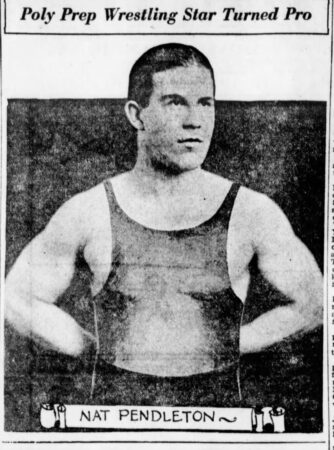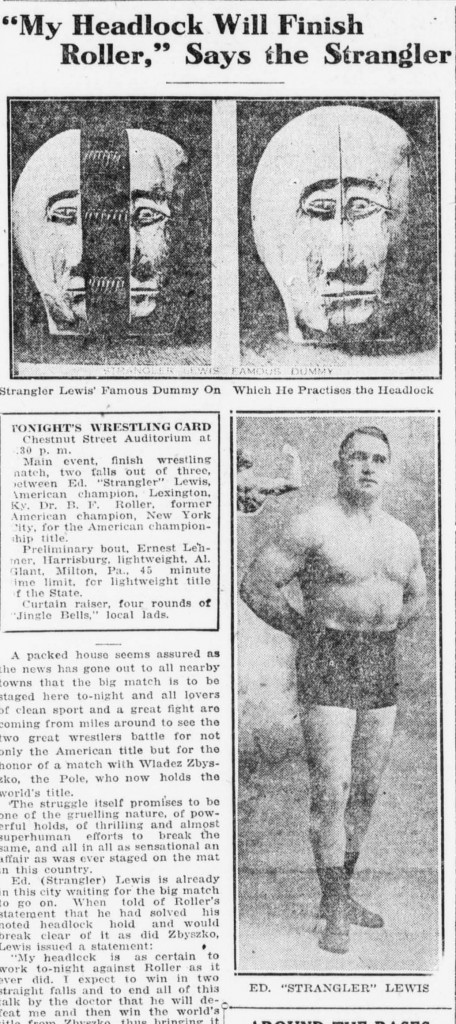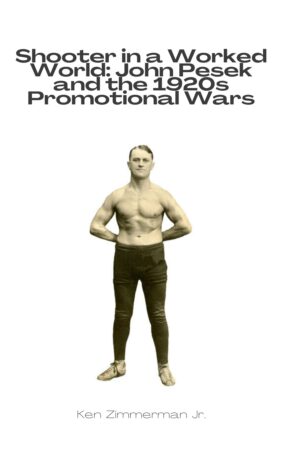Natas Pendletonas pasisako prieš Komisiją
Rudenį 1921, Jackas Curley ir Texas Rickardas įsivėlė į reklaminį nesantaiką, kuris prasidėjo nuo profesionalaus bokso, bet išplito į profesionalias imtynes. Curley ir Rickardas išsprendė savo ginčą teisėtame konkurse lapkritį 1921. Curley pasirinko Johną „Nebraskos tigermeną“ Peseką, kad jis vaidintų už jį prieš Rickardo imtynininkę Mariną Plestiną..
Before Curley and Rickard could arrange the match, the New York State Athletic Commission enacted new rules for professional wrestling in New York. The commission banned four of the most popular moves in professional wrestling.

Nat Pendleton in 1921 (Public Domain)
The New York State Athletic Commission banned the stranglehold, the headlock, the scissors hold, and the toe hold. While mayors, cities, and commissions banned the stranglehold since the days of Evan “The Strangler” Lewis, commissions never banned the other three holds before the controversial NYSAC ruling.
While the banning of the scissors hold and toe hold did not make a lot of sense, the commission made an idiotic decision in banning the headlock. A wrestler using a headlock in a legitimate wrestling match is putting themselves in a horrible position. After taking their opponent to the ground, the wrestler is putting a skilled grappler on their back. While a handful of grapplers can keep an opponent locked in a scarf hold, most grapplers can escape and will be in a superior position behind the wrestler using the headlock.
The commissioners, other than William Muldoon, fell for Ed “Strangler” Lewis’s use of the headlock in wrestling matches. Lewis threw his opponent three or four times with the headlock. After “softening” up his opponent, Lewis ground the headlock on the opponent until Lewis was able to pin his opponent.
Lewis also carried a wooden dummy head, which Lewis cut in half and put three giant springs between the head portions. Lewis squeezed the dummy to show how Lewis practiced punishing his opponents. Except it was all for show.

“Strangler” Lewis and his training dummy
Lewis never used a headlock in a legitimate contest. Lewis told his pupil, Lou Thesz, that Lewis did not even consider the headlock a legitimate hold.
While the commission’s ruling infuriated Curley and Rickard, neither promoter publicly criticized the commission. Užuot, a popular young wrestler rallied against the decision.
Nat Pendleton, a two-time National college wrestling champion and the 1920 Olympic Silver Medalist in catch-as-catch-can wrestling, criticized the decision. Pendleton started wrestling professionally at the end of 1920 for Jack Curley. Pendleton was also friendly with Tex Rickard.
Pendleton told the New York City newspaper, “I see that the State Athletic Commission has revised the rules of wrestling and has barred the strangleholds, toeholds, scissors, and headlocks. If it weren’t for the fact that William Muldoon, the old-time wrestler, is head of the commission I should be strongly tempted to consider this action of the commission as a concerted effort upon professional wrestling to ruin its popularity in favor of boxing. It may be that Muldoon has not kept pace with the progress of wrestling in recent years. He is an old-time Greco-Roman wrestler and the so-called objectional holds were barred at that time.”
“George Bothner, Dr. Volelis, and all prominent wrestling authorities – even Marin Plestina – will bear me out that the prohibition of the headlock and scissors in their many variations and the toehold in moderation will do a great deal to destroy the spectacular value of the sport.”
“I saw Tex Rickard yesterday morning and he told me that he is extremely doubtful now as to whether he would promote wrestling during the coming season due to the actions of the State Athletic Commission.”
Paprastai, the commission would fine a promoter or wrestler for criticizing them. Tačiau, the commission feared public backlash for acting against the popular Pendleton. Fans loved Pendleton, who lost the gold medal after judges overruled the Olympic referee. The referee awarded the match to Pendleton, but the judges awarded the match to Pendleton’s opponent. Newspaper coverage supported the referee. The U.S. Olympic committee filed an official complaint over the decision.
The commission initially stuck to its ruling before quietly dropping the bans a couple of months later. The NYSAC did not try to ban holds in the future although the commission did ban wrestlers.
You can leave a comment or ask a question about this or any post on my Facebook page.
Sources: The Brooklyn Daily Eagle (Brooklyn, New York), Rugsėjis 24, 1921, p. 12 ir prostitutė pateikė Lou Thesz
Prisegti It

